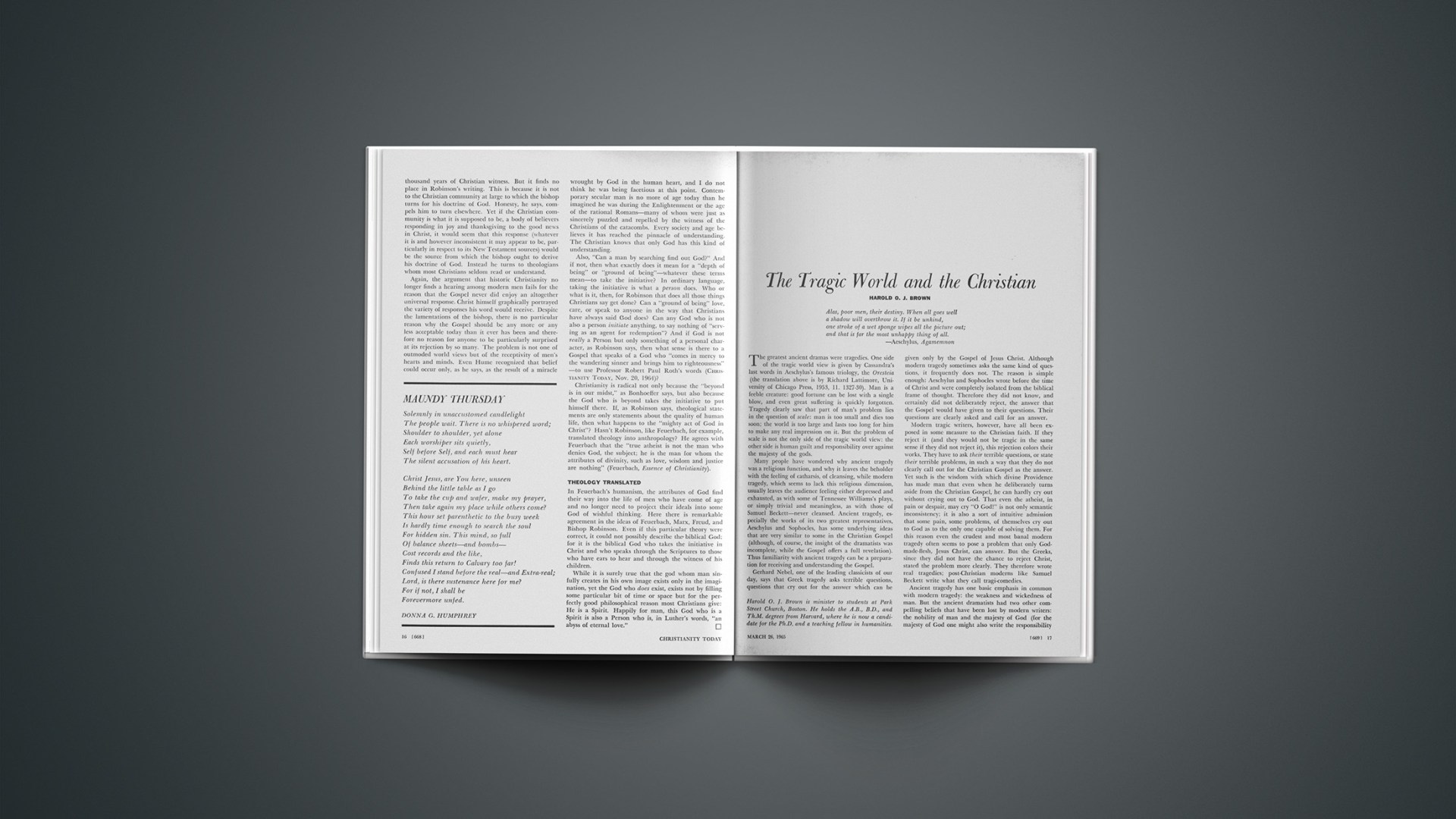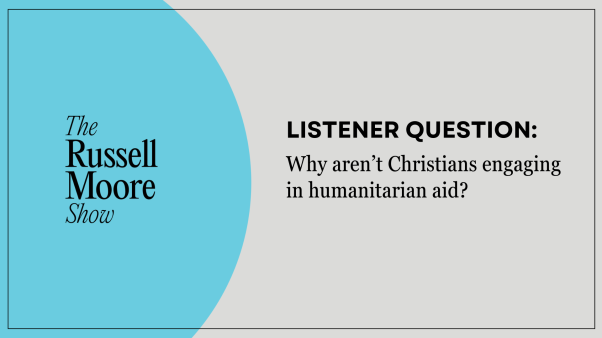The greatest ancient dramas were tragedies. One side of the tragic world view is given by Cassandra’s last words in Aeschylus’s famous triology, the Oresteia (the translation above is by Richard Lattimore, University of Chicago Press, 1953, 11. 1327–30). Man is a feeble creature: good fortune can be lost with a single blow, and even great suffering is quickly forgotten. Tragedy clearly saw that part of man’s problem lies in the question of scale: man is too small and dies too soon; the world is too large and lasts too long for him to make any real impression on it. But the problem of scale is not the only side of the tragic world view: the other side is human guilt and responsibility over against the majesty of the gods.
Many people have wondered why ancient tragedy was a religious function, and why it leaves the beholder with the feeling of catharsis, of cleansing, while modern tragedy, which seems to lack this religious dimension, usually leaves the audience feeling either depressed and exhausted, as with some of Tennessee Williams’s plays, or simply trivial and meaningless, as with those of Samuel Beckett—never cleansed. Ancient tragedy, especially the works of its two greatest representatives, Aeschylus and Sophocles, has some underlying ideas that are very similar to some in the Christian Gospel (although, of course, the insight of the dramatists was incomplete, while the Gospel offers a full revelation). Thus familiarity with ancient tragedy can be a preparation for receiving and understanding the Gospel.
Gerhard Nebel, one of the leading classicists of our day, says that Greek tragedy asks terrible questions, questions that cry out for the answer which can be given only by the Gospel of Jesus Christ. Although modern tragedy sometimes asks the same kind of questions, it frequently does not. The reason is simple enough: Aeschylus and Sophocles wrote before the time of Christ and were completely isolated from the biblical frame of thought. Therefore they did not know, and certainly did not deliberately reject, the answer that the Gospel would have given to their questions. Their questions are clearly asked and call for an answer.
Modern tragic writers, however, have all been exposed in some measure to the Christian faith. If they reject it (and they would not be tragic in the same sense if they did not reject it), this rejection colors their works. They have to ask their terrible questions, or state their terrible problems, in such a way that they do not clearly call out for the Christian Gospel as the answer. Yet such is the wisdom with which divine Providence has made man that even when he deliberately turns aside from the Christian Gospel, he can hardly cry out without crying out to God. That even the atheist, in pain or despair, may cry “O God!” is not only semantic inconsistency; it is also a sort of intuitive admission that some pain, some problems, of themselves cry out to God as to the only one capable of solving them. For this reason even the crudest and most banal modern tragedy often seems to pose a problem that only God-made-flesh, Jesus Christ, can answer. But the Greeks, since they did not have the chance to reject Christ, stated the problem more clearly. They therefore wrote real tragedies; post-Christian moderns like Samuel Beckett write what they call tragi-comedies.
Ancient tragedy has one basic emphasis in common with modern tragedy: the weakness and wickedness of man. But the ancient dramatists had two other compelling beliefs that have been lost by modern writers: the nobility of man and the majesty of God (for the majesty of God one might also write the responsibility of man to God). To recognize man’s smallness and evil disposition requires no wonderful insight; it is obvious enough to anyone deeply involved in the struggle and ambiguity of life. And the mere recognition of this is in a sense enough to make one cry to God; it is this existential recognition that produced the truism, “There are no atheists in foxholes.”
A Moment Out Of The Mire
But to look at man with all his fraility, hypocrisy, and proneness to wrong is not enough to bring one to a knowledge of God. Many are satisfied to dwell on their own insignificance and meaninglessness, to use it as its own excuse, and to occupy their lives in chasing goals which on reflection they would admit to be neither worthy nor attainable. Much modern tragedy consists in this: A man who has been wallowing in some mire raises his head just long enough to see where he is and to sense his futility. Then, an instant later, he sinks back into the mire and is fully covered. A vision of the plight of man can be crushing—too crushing, if untempered by a vision of God, ever to allow man to rise out of his slough of self-pity and futility.
In ancient tragedy, the weakness and wickedness of man were never seen alone. Man had the possibility of grandeur. For this reason, indeed, ancient tragedy deals with men who are great in human terms: Agamemnon, lord of all the Greeks; Oedipus, brilliant and powerful king of Thebes; and others like them. Modern tragedy, by contrast, is so little conscious of the possibility of grandeur in man that it deals with nearly nameless mediocrities: Willy, of Death of a Salesman (Arthur Miller); Stanley and Blanche, of A Streetcar Named Desire (Tennessee Williams); Vladimir, Estragon, and Pozzo, of Waiting for Godot (Samuel Beckett).
The ancient dramatists also saw that man’s potential for grandeur did not lie merely in his ability to earn a place of honor among his fellow mortals, although that seems to have been taken for granted. It depended more on the fact that he was of necessity involved with the divine power, with the gods. In the Oresteia, Agamemnon is murdered by his wife Clytemnestra for reasons that would certainly seem sufficient to a modern: he had killed their daughter, he had brought a concubine home from Troy, and she herself was living with a lover. But Aeschylus makes the vital point that before his murder Agamemnon arrogated to himself divine honor: “My feet crush purple as I pass within the hall” (Agamemnon, 1. 957). This symbolic treading on the sacred fabric showed that Agamemnon died not only for his crimes against his child and his wife but also for his willingness to be honored as divine. His fate reminds us of that of Herod, who did not protest when his subjects said of his speech, “It is the voice of a god, and not of a man” (Acts 12:22). Thus for the ancients, human greatness always had to be measured against a man’s relation to the divine. Agamemnon fell not least because of this impiety. His son Orestes, on the other hand, exhibited piety to the divine command when in response to Apollo’s bidding he avenged his father’s murder by killing his mother.
Orestes’ act of vengeance reveals several aspects of Aeschylus’s view of the relation of men to the gods. First, it was an act of piety, or obedience, because it had been commanded by Apollo. Second, it was a responsible act and consequently involved Orestes in the vengeance of the Furies, dark underworld goddesses whose task was to avenge crimes of violence performed against one’s own blood relatives. Third, Orestes’ fidelity to Apollo not only involved him in the conflict between this Olympian god and the Furies of the underworld but also meant that Apollo was responsible to him. Finally, in the conclusion of the cycle, when the Furies accepted the justice of Orestes’ deed, their own character was changed and they became the Eumenides, the “favorers.” Thus Orestes’ commitment to Apollo and his subsequent involvement in the conflict between the Olympian and underworld divine powers led to a realignment among the gods, to a change in the aspect of the divine. This offers at least a partial anticipation of the words of the Christian creed, “Who for us men and for our salvation came down from heaven.…” The incarnation of the Son of God in human flesh is conclusive indication that God’s attitude towards men is favorable, not furious.
The Problem Of Scale
But for the ancients there remained the problem of scale, of the greatness of God and the smallness of man. The problem of responsibility and guilt, which Orestes finally resolved, can be met, but not the problem of scale. Man in tragedy learns about God only when he is forced to recognize his own limitations over against the transcendent majesty of the divine. This he realizes only through suffering, as the chorus says in the Oresteia (Agamemnon, 11. 177, 178). When in despair man admits his finitude and recognizes that he has no claim on the divine majesty, there comes to him a peace and submission and at the same time a kind of exaltation. Orestes’ vindication is the most impressive in ancient tragedy; yet it is really only a return to peace. Having done what he had to do, Orestes is allowed by the gods to stand. He is not destroyed. But to learn this he has had to suffer, and at the end there is no reward, only recognition of his true condition and a peaceful acquiescence in it. Here there is a striking difference from Christianity: the ancient tragic man could learn to know the divine only in suffering. The Christian can know God in love.
Yet ancient tragedy at least recognizes that there is a divine order, and that although it costs suffering, there is fulfillment for man in coming to know this and in realizing where he stands in relation to the divine. This conclusion is far above that of modern tragic writing, in which man is merely crushed and, never realizing that he is in conflict with a transcendent divine power, is unable to understand or accept his own futility. The banality of Vladimir and Estragon in Beckett’s Waiting for Godot, compared to the nobility of Orestes, is the inevitable outcome when the tragic writer has lost or chooses to ignore the vision of God. A loss of the vision of God, even if it is no more personal or specific than that of the righteous, divine order seen by Aeschylus, of which Apollo and the Furies are only representations, inevitably results in a diminution in the stature of man. Man, measured against himself, is meaningless. Measured against divine righteousness by Aeschylus, he is at least something. Apollo respects Orestes’ fidelity, and the Furies are transformed by the encounter with him. Orestes knows the divine only in his suffering, but at least he knows it. That is something—to be thought and found capable of at least some knowledge of God.
The tragic man of ancient drama and the Christian have a good portion of their road in common. Both are led by the encounter with reality to the very limits of their being. For the tragic man this means an encounter with the rocky cliff of divine transcendence, which he cannot climb. But for the Christian the limit of life is not a rocky wall, where he can only look on the divine majesty from afar and then die. On the contrary, revelation opens for him a path through the wall, even at the very limit of life, the wall of death itself. There is One to lead him through—One who was with the Father from the beginning but who became a Son of men for our sakes, One who has passed through that wall ahead of us to “deliver them who through fear of death were all their lifetime subject to bondage” (Heb. 2:15).
The tragic world has validity for the Christian. It is true for him, as for the ancient Greek, that man is limited, that man is responsible, and that at the limit of life man must confront the divine. He can recognize this and even suffer under its tragic intensity without seeking refuge in the impoverished world of modern tragedy, where man is neither really guilty nor really noble but only silly and futile. He can face tragedy in all its intensity, accept it honestly, and recognize his human smallness and guilt in relation to the divine. And then, in this state, in which through suffering and self-recognition he sees where he really stands, he can lift his head with confidence, because the divine—not just the impersonal divine but the God of the Bible, who has told us his name—has entered his world, has shared his limitation and suffering, has gone before to bring him through the wall of death, and is, in that wonderful phrase, “not ashamed to call them brethren” (Heb. 2:11). We should not shy away from the tragic in human life (although we should shy away from the tragi-comic futility of modern despair). We should look at it, and let our friends see it, and let it sink in. For it is the reality of human life, and there is no escape from it—except one, even the One who, being high and holy Reality himself, says, “I am the door.”










